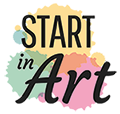Welcome to Easy Metal Tooling! Start right here.
Metal Tooling Materials
How to Tool Metal
Two Ways to Color the Metal
Protecting Your Piece From Dents
A Fun Project, and an Inexpensive Way to Start!
An Invitation For You
I'm so excited to see what you create!
Please come over to our private Facebook Page and show off your work!
You can join Right Here
Tools and Resources for this lesson:
These rolls of Aluminum is the best price for the largest quantity. Great if you're going to teach classes. There's also an option for single sheets.
These Items are from suppliers other than Amazon
9×12″ Single Sheet of Aluminum
Colored Single Sheets of Aluminum
You may be able to find the Birchwood sticks at a local beauty supply store or nail salon. The shipping price is high for such a small item.
Some Examples of This Medium:
I love this charming dragonfly post topper! This medium would work for something like this, but there are a few caveats:
If you use paint for the black antiquing, you would need to spray or paint a clear sealer over the top.
The fill in the back needs to be bondo or something other than wax, which would melt in the sun.
Attach with nails or a weatherproof glue.

I’ve included this piece to show you that you can combine the black antique finish with color. This is heavier metal and some of this detail is engraved and not embossed.
But to get the color effect, you would do the black antiquing first, then when the paint was dry, you could fill in areas with permanent marker.

Look at this lovely, scenic piece! This is totally possible when you have good line art to begin with and plan your levels of “popping out.” The figures in the center are deeply embossed, the trees, flowers, and background figures are less embossed, and the fence, walls, and background are embossed the least. From the back these would not be very deep and you’d press lightly to do them.

I usually prefer that a transparent color is used on the metal – so you can tell that it’s metal!
But I was impressed by the effect from spray paint on this piece:

This is an example of how tooled metal is used for architectural decoration. This metal is much heavier and uses tools that are hefty, but I wanted to include this photo to show you what is possible with this beautiful medium. You can create something that looks quite similar with the process you’ve learned here. To do something that pops out in a semi circle like this, you would have to have a solid to attach to, and some really good glue! Also, the embossing would need to be filled in on the back to protect it from getting dented.

Metal embossing is a popular activity in the studio. For one young student’s class we painted keepsake boxes, and then attached tooled metal to the lids.

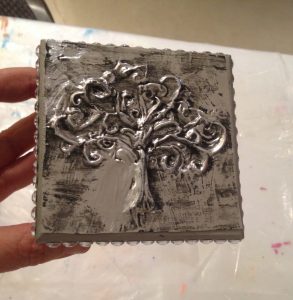
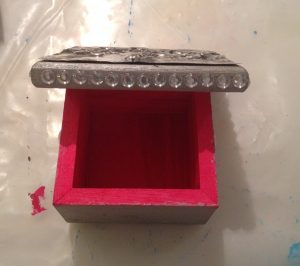
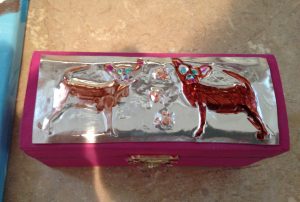
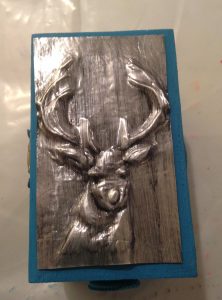
And the ever popular Christmas Tree Ornaments:
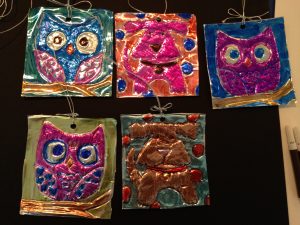
More ideas for this medium:
The possible images that can be produced in tooled metal are endless! Here are a few suggestions to spark ideas…
Mandalas – you see them everywhere these days! You can draw your own, or find many line art images online. There are also lots of Mandala coloring books.
For your first project I’d go with something that is simple. The images below aren’t too difficult.


A Family Crest – if your family has one, can you imagine how cool it would look in metal? What a meaningful gift this would make for a special family member!

Landscape – a simple landscape can certainly be done in metal.

Architecture or Architectural Elements – I can imagine any of these in metal, can you?
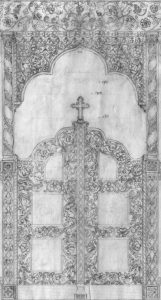
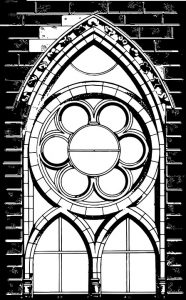


I’m so excited to see what you create! Please come over to our private Facebook Page and show us all! You can join Right Here
Science and Art: This stuff is so great!
The positive effects from making art have been studied by scientists, with some mind-expanding results! Recently the American Association for the Advancement of Science published a fascinating article titled “How Engaging with Art Affects the Human Brain.” It describes the work of Dr. Laura Likova, who took congenitally blind individuals with no measurable activity in their visual cortexes and taught them to draw by touching raised line images. After they learned to draw by repetition and memory, they were tested again using an MRI scan, and there was now activity in the visual cortexes of their brain. So just the mental visualization of making images actually grew their brains!
